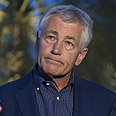
Hagel: US rethinking arming Syrian rebels
Defense Secretary says Obama government considering options for arming rebel forces; Syrian activists say at least 50, perhaps 100 dead, including women, children, in army raid on Baida
The Obama administration is rethinking its opposition to arming Syrian rebels, Defense Secretary Chuck Hagel said on Thursday.
At a Pentagon news conference, Hagel said the administration is considering a range of options. He said he personally has not decided whether it would be wise to provide weapons to the rebels. "Arming the rebels, that's an option," he said. "We must continue to look at options."
Related stories:
- Syrian president showing renewed confidence
- Lebanon dragged in as Hezbollah joins Syria war
- Heavy clashes in Syria near Lebanese border
Hagel added that the US is considering a range of options in consultation with allies.
At the same news conference, British Defense Secretary Philip Hammond said his government has not yet provided arms to the Syrian rebels, but would not rule it out.
Also Thursday, state forces and militias loyal to Syrian President Bashar Assad stormed the coastal village of Baida on Thursday, killing at least 50 people including women and children, the Syrian Observatory for Human Rights said.
Video courtesy of jn1.tv
The pro-opposition monitoring group said the final death toll was likely to exceed 100. Many of those killed appeared to have been executed by shooting or stabbing, it said, and other bodies were found burned.
Activist reports on the killings could not be independently verified as the Syrian government restricts access for independent media.
Hours earlier, rebels had attacked a busload of pro-Assad militiamen, known as shabbiha, killing at least six and wounding 20. In response, government forces and shabbiha surrounded Baida and nearby Maqreb, near the city of Banias, and pummelled them with mortar fire before raiding Baida.
Assad's forces have mounted a string of attacks reaching from the capital Damascus and the central city of Homs out to the Mediterranean coast, homeland of the Alawite minority sect to which Assad himself belongs.
The two-year uprising against four decades of Assad family rule has been led by Syria's Sunni Muslim majority, and sectarian clashes and alleged massacres have become increasingly common in a conflict that has killed more than 70,000 people.
Baida was the site of one of the first sectarian clashes, when Alawite shabbiha fighters attacked Sunni street protesters in the first few months of the uprising, killing several people. The city of Banias and surrounding villages are a largely Sunni pocket surrounded by Alawite towns.
"The fate of dozens of residents is still unknown," said the British-based Observatory, which collates reports from a network of activists across Syria.
"Several homes were also destroyed by regime forces and loyalist gunmen from the surrounding Alawite villages. Information is still scarce because phone and internet lines have been cut."
Assad advancing
State forces and loyalist militias appear to have made substantial gains in recent weeks, seizing several suburbs outside Damascus and recapturing territory in Homs, birthplace of the armed insurgency.
Fighters and activists said pro-Assad forces had retaken a central district of Homs on Thursday, driving a wedge between two pockets of rebel resistance. The Observatory said the attack had been supported by Iranian and Lebanese Hezbollah coordinators.
Shiite Iran and Hezbollah have denied sending forces to fight alongside Assad's troops, but Hezbollah leader Hassan Nasrallah has been increasingly open about the group's presence in Syria, where he says it is defending Lebanese and Shiite communities from attack by Sunni Muslim rebels.
The recapture of Wadi al-Sayeh, which links the besieged rebel stronghold of Khalidiyah to the opposition-held old city, appears to be one of a series of focused counter-offensives that mark a shift from the indiscriminate campaigns seen earlier in the conflict.
Homs sits on the main road connecting Assad's Damascus powerbase with the Alawite-dominated coast.
Assad's forces also seized the town of Qaysa on the eastern edge of Damascus on Thursday, part of a steady move north from the airport on the city's southeastern edge that aims to lock down the eastern approaches to the city and close off weapons supplies from the Jordanian border.
A call issued by several activists in the area warned the disparate rebel forces to pull together or face defeat.
"If you do not unite under one flag, the regime is going to hunt you down, one brigade after another," it said.
- Receive Ynetnews updates directly to your desktop










